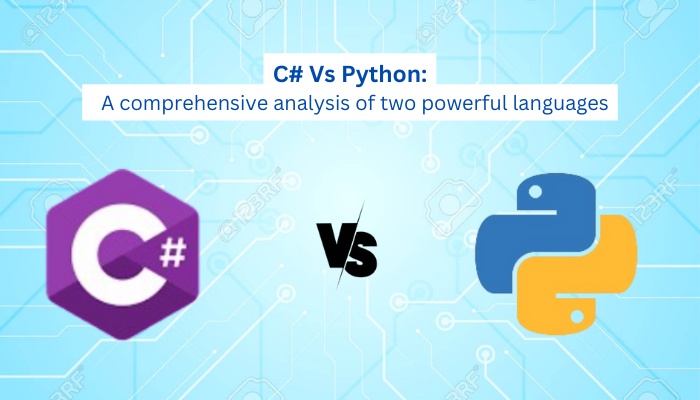Introduction
Thinking about what makes a project successful? With the appropriate tech tools, it all begins! The framework and platforms you choose impact your project. C# and Python are among the two prominent programming languages. In this context, picking the right programming language can feel like a challenge. Don't worry. We'll explain all you need to know about these awesome programming languages: C#, and Python. Let’s understand each language to identify their differences.
Understanding C# and Python
C# is a popular programming language developed by Microsoft. It is a general-purpose, object-oriented, and modern programming language since it belongs to the C language family. C# provides a robust and reliable development environment for a variety of applications due to its robust ecosystem and interoperability with the .NET framework. Additionally, with its simple, robust, type-safe, and adaptable design, C# is a great choice for a variety of applications, including desktop software, web, mobile, and game development. To fully utilize C# for your project, you can collaborate with a trustworthy company to hire C# programmer that will ensure your project is executed effectively. The following are the reasons to choose C#:
- Effective & Robust
- Object-oriented Programming Language
- It is cross-platform.
- Type-safe and open-source
- Easy to Create
Python is also a widely used programming language. Much like C#, it is also recognized as an Object-oriented and high-level programming language. Python's vast standard library and simplicity of use make it an appealing option among developers. Python is preferred for numerous fields, including Scientific computing, artificial intelligence, machine learning, web development, data analysis, and automation. Reasons behind Python’s popularity:
- Simple and concise syntax
- Extensive library ecosystem
- Open source
- Large and active community
- Incredible portability
C# vs Python: Basic differences
Although Python and C# are both widely used programming languages, they have several key differences. Making a sound decision requires understanding these variations.
Here is the comparison of C# vs Python:
|
Basics |
C# |
Python |
|
Performance |
Quicker Execution due to compilation to native code. |
Slower Execution as of dynamic type and interpretation. |
|
Multi-Threading |
C# leverages the .NET framework for easy multi-threading. |
Global Interpreter Lock (GIL) necessitates using multiple processes in multi-threading. |
|
Portability |
C# offers partial portability |
Its code is incredibly portable with interpreter to almost anywhere. |
|
Typing |
Statically typed |
Dynamically typed |
|
Databases and Libraries |
Rich set of libraries however limited to Microsoft development |
Extensive library ecosystem |
|
Debugging |
Easier to pinpoint the source of errors. |
Harder to pinpoint the exact cause of an issue |
|
Supported Frameworks |
Supports work on the .NET framework |
Supports various platforms, including Java (JVM), .NET, C, and JavaScript. |
|
Readability |
Harder to read due to complex syntax |
Easier to read due to simple syntax |
|
Pointers |
Pointers only used in unsafe mode |
Lacks support for pointers |
Use cases of C# and Python
Python and C# are both strong programming languages, but they excel in different domains. Here's a breakdown of their typical use cases:
C# Cases:
- Enterprise software development: C# is preferred for developing enterprise applications because of its reliable typing, smooth interaction with the .NET framework, and exceptional performance. These qualities render it a top choice for constructing dependable and secure large-scale business applications.
- Game development: C# is a major programming language used in Unity, a well-known game engine. Game developers prefer C# because of its object-oriented design and capability to manage intricate visuals and physics simulation.
- Desktop Apps: C# is a preferred language for developing feature-rich desktop apps with simple user interfaces because of its smooth Windows integration. WPF and Windows Forms are two instances of libraries that make development easier.
- Mobile Apps: C# offers a compelling option through the Xamarin platform.By leveraging C# code that can be shared between platforms, developers can use this platform to create applications for both iOS and Android. With the ability to share code, mobile app development expenses are reduced along with development time.
Python Cases:
- Scientific computing: Python is a preferred language for tasks involving numerical analysis, data manipulation, and visualization because of its robust libraries, which include NumPy, SciPy, and Matplotlib.
- Machine Learning (ML) and Artificial Intelligence (AI): Its extensive ecosystem of libraries, including TensorFlow, PyTorch, and scikit-learn, provides a comprehensive toolkit for every stage of the ML workflow. These libraries offer tools for data preparation, model training, assessment, and implementation.
- Tools like Scapy and Scrapy aid in ethical hacking and web security assessments, while Nmap and Scapy help analyze network traffic for potential threats.
- Cybersecurity & Network Programming: Tools like Scapy and Scrapy aid in ethical hacking and web security assessments, while Nmap and Scapy help analyze network traffic for potential threats.
Wrapping up
Deciding between C# and Python can be challenging, as they each have strengths and weaknesses. Ultimately, the choice boils down to project preference rather than the risk of selecting an unsuitable language for the project. C# excels in performance and effortlessly integrates with the .NET framework, which makes it an effective option for building robust applications. Python, on the other hand, places more emphasis on adaptability and accessibility. Development is streamlined by its dynamic typing and interpreted nature, particularly for data exploration jobs. Consider your project needs: should you construct a complex application or start with data analysis? In the end, both languages are strong, and the best one to use will depend on the particular task at hand.


No comments yet